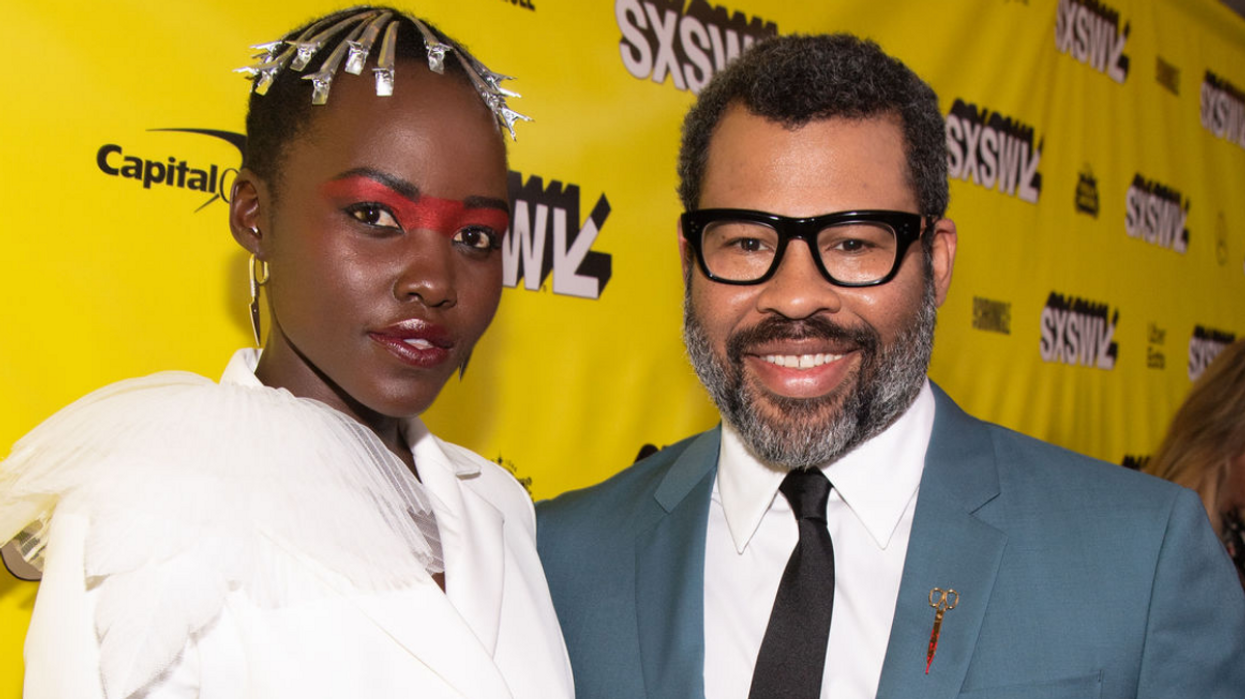If Jordan Peele Isn't Pissing People Off He Says He's "Doing it Wrong"
Jordan Peele and Lupita Nyong'o discuss Us.

Us is the type of movie you get to make when your last movie was Get Out.
Get Out cost in the neighborhood of 5 million dollars, but it made an estimated 255 million worldwide. It was nominated for best director, best actor, best picture and won for best original screenplay making Jordan Peele the first African American winner of that award.
A tough act to follow...
But also a license to take chances and push the envelope.
Jordan Peele seems to have thrown himself completely into the latter, with little concern or care for the former.
Peele and his Us star Lupita Nyong’o sat down to discuss the movie at SXSW. They lent some insight into how their partnership formed, how Peele views his process, and how opportunities for a diversity of voices are changing the cinematic landscape.
On creating the characters and the casting process
One of the most striking things about Us is that the cast pulls off double-duty as both the main characters and the monsters chasing them.
Picture Jamie Lee Curtis also playing Michael Myers. Or Roy Scheider also playing Jaws. That's a weird one.
But the point remains, it’s a huge ask of a cast.
Peele said, “...What's really remarkable was watching these guys play against their own selves. We shoot it that way, obviously. They're piecing together not only these two performances but these reactions to a performance they're not even looking at. I don't want to peel back the layers too much because I think the illusion that the movie creates is part what I'm proud of.”
"I think the illusion that the movie creates is part what I'm proud of."
He’s right. The illusion works so well that it’s easy to forget that the same actors are playing both roles in each of these intense sequences. In Nyong’o’s case particularly as she seamlessly inhabits both parts, often creating a dynamic tension central to the entire movie with a performance she gave yesterday.
Nyong’o said, “...the characters we played are separate, they're also linked…. as an actor, you invest in one perspective and you then advocate for that perspective. And here you had to do that. And then the next day you're on the complete opposite perspective.”
Us is packed with layers of meaning, some seeming closer to the surface than others. Peele spoke on the way he viewed the tethered ‘red characters’ as he called them, and where they may have come from:
"...I think the tethered version of myself is probably the one that is making me do these fucked up movies.”
“In the early days of developing this concept, the way I would talk to the actors about it… I thought of the tethered characters, the red characters, at least figuratively if not literally, a manifestation of our internal darkness, our guilt. The things that we suppress. We all have that shadow stuff in us somewhere. This movie is about exploring it, not only as individuals but as a group, what the shadow self of our family, our faction, our town, our country is. I think the tethered version of myself is probably the one that is making me do these fucked up movies.”
"I thought of the tethered characters, the red characters, at least figuratively if not literally, a manifestation of our internal darkness, our guilt."
How did Jordan Peele and Lupita Nyong’o come together on this project? According to Nyong’o it started on the set of Black Panther:
“[Get Out] came out when I was making Black Panther. Black Panther was intense and time-consuming and all-encompassing. But, I found time to go to the cinema five times in one month while I was working on that film to watch Get Out. I was fixated and I loved it. I loved the conversations afterward with my brother who was in Florida, my best friend in New York... [It was] a cinematic experience that we could grab and take with us, and it became such a joy... and so I was like 'I want to work with that guy right there.”
But she didn’t pursue it, rather serendipitously it happened on its own...
“...a few months later I received this offer and I was like of course I'm doing it. I'm doing it. Whatever it is…. Now let me read the script.”
"...of course I'm doing it. I'm doing it. Whatever it is…. Now let me read the script."
While Nyong’o had essentially made up her mind about doing the film, she still discussed the project with Peele.
“I talked to him on the formality, writing notes, really listening to what he was trying to get across. And he was like 'if you do this film' and 'if you do this film'... At the end of the conversation, I was like 'Jordan, who are you kidding? I'm doing this film.”
"At the end of the conversation, I was like 'Jordan, who are you kidding? I'm doing this film."
On the representation of diversity
Us is about an African American family, with a particular focus on the mother of the family. And yet the movie has nothing to do with her race or gender. Peele even said that the movie being about a black family, but having nothing to do with race was the most important thing about it.
Peele spoke about how the industry begins changing as soon as people let go of long-held assumptions:
“...for so long in the industry had these baseless ideas that black people can't open movies overseas, these myths that are brought on by systemic racism. It's a self-perpetuating prophecy. If you give people opportunities then, they have opportunities to succeed, but they also need opportunities to fail. The same way white people do.”
"..for so long in the industry had these baseless ideas that black people can't open movies overseas, these myths that are brought on by systemic racism. It's a self-perpetuating prophecy."
Peele went on, “...hopefully we'll make some money with it [Us] and once again show the world that it's a worthy investment artistically and monetarily to see fresh talent. To see stories and perspectives that we haven't been seeing…”
For Jordan Peele fresh stories and representation are important, but it’s not the only important thing, “I'm a comedy guy, my pedigree, my DNA as an artist is the desire to provoke. I think if I'm not doing something that might piss people off then I’m doing it wrong.”
"I think if I'm not doing something that might piss people off then I’m doing it wrong."
Us comes to theaters on March 22, it shares a fresh perspective, will start conversations, and probably also piss some people off. For Jordan Peele and Lupita Nyong’o that means it’s mission accomplished.
For more, see our ongoing list of coverage of the 2019 SXSW Film Festival.
No Film School's podcast and editorial coverage of the 2019 SXSW Film Festival is sponsored by Blackmagic Design.
















